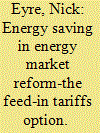|
|
|
Sort Order |
|
|
|
Items / Page
|
|
|
|
|
|
|
| Srl | Item |
| 1 |
ID:
117237


|
|
|
|
|
| Publication |
2013.
|
| Summary/Abstract |
The use of feed-in tariffs (FITs) is now widespread for renewable energy and under discussion for other low carbon electricity generation, but not for energy efficiency. There is a small literature on FITs for electricity demand reduction, but not energy efficiency more generally. This paper considers the general application of FITs on the demand side and sets out the economic arguments in the context of changing energy markets. It then discusses the implications of some practical issues, including the definitional problems arising from the difference between energy efficiency and demand reduction. Using experience from historical energy efficiency programmes, it considers the public benefits, payment methods and policy scope that need to be considered and how these might affect policy design. It makes some provisional estimates of economically justified payments in the context of the proposed UK energy market reform. It concludes that FITs for energy saving might be a powerful tool for incentivising energy efficiency.
|
|
|
|
|
|
|
|
|
|
|
|
|
|
|
|
| 2 |
ID:
117332


|
|
|
|
|
| Publication |
2013.
|
| Summary/Abstract |
This paper makes a case for examining energy transition as a geographical process, involving the reconfiguration of current patterns and scales of economic and social activity. The paper draws on a seminar series on the 'Geographies of Energy Transition: security, climate, governance' hosted by the authors between 2009 and 2011, which initiated a dialogue between energy studies and the discipline of human geography. Focussing on the UK Government's policy for a low carbon transition, the paper provides a conceptual language with which to describe and assess the geographical implications of a transition towards low carbon energy. Six concepts are introduced and explained: location, landscape, territoriality, spatial differentiation, scaling, and spatial embeddedness. Examples illustrate how the geographies of a future low-carbon economy are not yet determined and that a range of divergent - and contending - potential geographical futures are in play. More attention to the spaces and places that transition to a low-carbon economy will produce can help better understand what living in a low-carbon economy will be like. It also provides a way to help evaluate the choices and pathways available.
|
|
|
|
|
|
|
|
|
|
|
|
|
|
|
|
| 3 |
ID:
111321


|
|
|
|
|
| Publication |
2012.
|
| Summary/Abstract |
Despite an emerging consensus that societal energy consumption and related emissions are not only influenced by technical efficiency but also by lifestyles and socio-cultural factors, few attempts have been made to operationalise these insights in models of energy demand. This paper addresses that gap by presenting a scenario exercise using an integrated suite of sectoral and whole systems models to explore potential energy pathways in the UK transport sector. Techno-economic driven scenarios are contrasted with one in which social change is strongly influenced by concerns about energy use, the environment and well-being. The 'what if' Lifestyle scenario reveals a future in which distance travelled by car is reduced by 74% by 2050 and final energy demand from transport is halved compared to the reference case. Despite the more rapid uptake of electric vehicles and the larger share of electricity in final energy demand, it shows a future where electricity decarbonisation could be delayed. The paper illustrates the key trade-off between the more aggressive pursuit of purely technological fixes and demand reduction in the transport sector and concludes there are strong arguments for pursuing both demand and supply side solutions in the pursuit of emissions reduction and energy security.
|
|
|
|
|
|
|
|
|
|
|
|
|
|
|
|
|
|
|
|
|